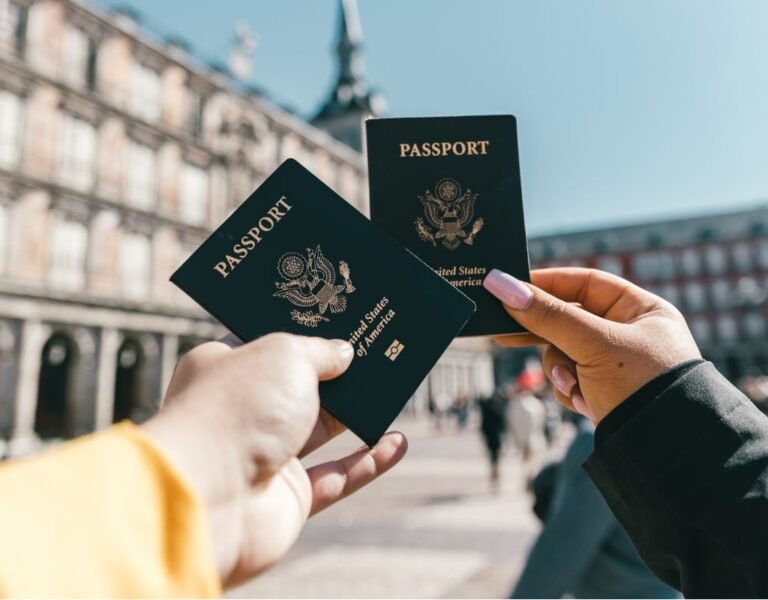How to Become an Expat (in Just 8 Steps)
|
Expats leave their home countries for a wide range of reasons, including those related to professional development, personal enrichment, the pursuit of a more fulfilling life, or simply curiosity about other cultures.
Choosing a destination for the move, making the move, and getting settled is a long journey, and in order to become an expat, one must go through the process properly.
In this article, we’ll talk about the process of becoming an expat.
A Quick Look at the Steps of Becoming an Expat
- Research the Destination Country
- Job Opportunities
- Legal Aspects that You Need to Follow
- Obtaining A Job
- Lodging and Accommodations
- Financial Planning
- Adjusting to New Culture and Forming New Relationships
- Getting Ready for the Move
What Exactly Does an Expat Mean?
It’s important to define an expat before diving into the specifics of living as one. We’ll define the term and look at the main features of expats in this part.

An expat, an abbreviation for “expatriate,” is someone who resides permanently or intermittently outside of their home country. Many expats go abroad for numerous reasons, including employment, higher education, retirement, or simply to immerse themselves in a new culture. They often come from varied backgrounds and professions, and their experiences might vary greatly depending on aspects such as location, duration, and motivation for their move.
Expats come from many walks of life, each with their own unique set of experiences, education, and career goals. The richness of the expat community can be directly attributed to the many different backgrounds and perspectives represented there.
Difference Between Expats and Immigrants
While both expats and immigrants are considered to be foreign residents, they are not the same thing.
The term “expat” is commonly used to refer to professionals on short or long-term international assignments, as well as tourists or those in search of a unique experience abroad.
In contrast, “immigrant” often refers to someone who plans to build a permanent life in a new country, sometimes for reasons such as economic opportunity, family reunification, or political sanctuary.
Motivations For Becoming an Expat

Many factors contribute to an expat’s decision to relocate abroad, such as:
Career Opportunities
It’s no secret that many people choose to leave their homes in search of better economic prospects, including better career opportunities.
Academics and Higher Studies
Some people travel beyond their borders in search of educational opportunities because they can’t get the kind of high-quality education they want or need at home.
Desire for Cultural and Lifestyle Change
Some people choose to live abroad because of the exciting opportunities that a completely different culture, language, and way of life offers.
Retirement
Some retirees decide to uproot and head for warmer climes, cheaper living costs, or simpler ways of life abroad.
Family and Love Life
Moving abroad to be with a partner or spouse, or to be near a spouse’s or partner’s family, is another common reason for expat relocation.
Steps to Follow for Becoming an Expat
Here are step-by-step measures that you can take in order to leave your country, settle in another, and become an expat to pursue your dreams –
Step 1: Research the Destination Country
Before taking the leap to become an expat, it is necessary to conduct extensive research on your desired destination. It’s crucial to learn the language as well as the local culture, customs, economy, politics, security, healthcare, and educational opportunities.
Culture and language
Gaining primary knowledge of the local language and culture can substantially help your move to a new country. Learn some standard phrases, greetings, and manners to ease your interactions with locals and establish rapport.
In order to fully appreciate and respect the local culture, it is also important to study the country’s history, traditions, and social conventions.
Living Cost
If you want to know if the relocation is within your financial capability, you need to look at how much things cost in both your present and potential new homes and compare them. Think about the costs of things like rent or a mortgage, gas, groceries, and entertainment. Cost-of-living comparisons are available on different websites and can be used to set financial goals and priorities.
Check out the 5 best and worst countries for expats.
Step 2: Job Opportunities
If you plan to work in a new country, it is extremely important that you research the job market in your desired location. Find out what fields are looking for people with your expertise, how many jobs are out there, and what people in that field make on average. It is also crucial to learn about the local employment regulations and the rights of employees.
Political Stability and Social Safety
Do some research on the political and safety situation in your potential new home. Crime rates, natural disasters, and political turmoil are just some of the hazards of which you should be aware. For first-hand accounts of safety concerns, read up on government travel advisories or join expat communities.
Healthcare System and Education
Find out more about the country’s healthcare system, medical facilities, and availability of medical specialists before you travel there. If you have kids, it’s important to learn as much as you can about the local educational system, from public and private schools to international and multilingual programs.
Knowing as much as possible about your prospective new home can help you decide whether or not expatriation is the best option for you. Your adjustment to your new life abroad will go more smoothly if you’ve done your homework.
Step 3: Legal Aspects that You Need to Follow
It’s important to get your legal ducks in a row before you leave the country, but that won’t be easy. You must research all of the prerequisites, from visa specifications to tax ramifications.
Requirements for Visa and Residency Permit
Find out what sort of visa you need to enter and remain in your prospective place of residence, which may include residence permits, work permits, or other types of authorizations. Consult the nearest embassy or consulate for updated information on specific country requirements and processing periods.
Tax Implications
There may be tax consequences in both your home country and the country you move to when you become an expat. Knowing your tax liabilities, including whether or not you will be subject to double taxation and whether or not tax treaties apply, is crucial. Consult a tax specialist with knowledge of foreign taxation to ensure you comply with all relevant tax regulations and avoid potential penalties.
Social Security and National Insurance
Learn the ins and outs of the national insurance and social security systems in your new country. Determine whether you will continue to contribute to your home country’s system or move to the new country’s system, and understand the benefits and requirements of each.
You may be able to keep receiving benefits even if you move overseas, thanks to bilateral agreements in place between your home country and the host country.
Bringing in Pets and Personal Belongings
Find out what must be done to bring your pets and other household belongings to your new country. Some examples of such restrictions are tariffs, levies, and mandatory registration of certain animal species and product categories. Make sure your pets have all the required paperwork and vaccines, and think about using a pet relocation agency to help you out.
Step 4: Obtaining A Job
Finding work in your host country can be difficult, but it can be done with preparation and the right resources.
Resources for Job Searching
To find work in your field, you should look at newspapers, online job sites, and professional networks. Join expat forums and social media groups to learn about local employment openings, and consider partnering with a recruitment service that specializes in placing expats.
Developing and Utilizing Networks
International career opportunities can be hard to come by, but networking can help. If you know anyone with contacts in your target country, you should contact them. Attend local networking events, join professional associations, or volunteer to create relationships that could lead to job prospects.
Curating CV and Cover Letter
Your resume and cover letter should reflect the norms of the country where you are applying for jobs. Highlight your experience, language skills, and adaptability. Previous employers’ references, preferably from within the country of application, should be prepared so that they can be provided if needed.
Successfully Going through Interviews
The interview process in your destination country may differ from what you’re used to, so it’s important to be prepared. Interviews can take place in person, over the phone, or over video conference, so it’s important to prepare in advance for both scenarios. Demonstrate your interest in employment and your ability to work in a foreign country.
Step 5: Lodging and Accommodations
The process of becoming an expat begins with finding a proper place to live. Think about how close you want to be to your workplace, your children’s schools, public transportation, and other essentials before settling in a neighborhood.
Housing Types
Find out what kinds of apartments, houses, or shared lodgings are on the market in your country of choice. Each choice may have varying fees, leasing terms, and availability, so examine the advantages and downsides before making a decision.
Finding and Setting a Suitable Place for Accommodation
To find a place to live, try looking on expat forums, social media groups, and websites specializing in real estate in the area. Try contacting a real estate agent in your area who is familiar with the market and can help you. Be prepared to give references, proof of income, and identification when getting a rental property.
Comparing Renting to Buying
Decide whether renting or buying a property is the best solution for your situation. While buying a home can be an investment and provide long-term stability, renting offers more flexibility and lower initial costs. Consult a local real estate expert to learn about the rules and hazards associated with property ownership in your country.
Rights for Renters
Learn about your rights as a renter in your new country. You need to understand the rental agreements, deposits, maintenance obligations, and conflict resolution procedures in the country you’re relocating to. You can better protect your interests and avoid misunderstandings if you know what your rights and obligations are.
Step 6: Financial Planning
Currency fluctuations, foreign banking, and saving for retirement are just a few of the aspects that must be taken into account when planning to manage your finances as an expat.
Living Costs and Budgetary Adjustments
Make a plan for your finances that takes into consideration the rising or falling costs of essentials like housing, transportation, food, and clothing. Maintain financial stability in your new country by keeping tabs on your expenditures and making any required adjustments to your budget.
Transactional Banking and International Money Transfers
You can streamline your financial operations and avoid high currency conversion fees by opening a local bank account once you arrive at your location. Find a provider that allows you to send money to or from your home country at a good exchange rate and at a low cost.
Considerations for Pension and Retirement
Find out how retiring overseas will affect your pension and other retirement plans. Consult a financial advisor with expertise in expat retirement planning to help you manage the complications of retirement savings options and international pension plans.
Inflation and Currency Fluctuations
Know the local currency and inflation rate before you go, as these factors might significantly alter your budget.
Step 7: Adjusting to New Culture and Forming New Relationships
To make the most of your time abroad, it is important to learn about the local culture and make connections with people there.
Accommodating Local Customs and Traditions
Learn about and honor the cultural norms of the country you are moving to. This includes familiarity with business customs, social norms, and different styles of communication. Building closer relationships with the local community requires a showing of respect for local culture.
Resources for Language Learning
Spend money on courses, books, or apps to learn the language so you can speak and understand it better. If you want to improve your language skills and meet interesting people, you should consider joining a language exchange club or a conversation club.
Connecting with People of the Society
Building relationships with locals is crucial to settling into a new place and experiencing a sense of belonging. Meet other expats and locals who share your interests by going to events, joining a club, or posting in an online forum. Making friends and acquaintances can make you feel more at ease in a new environment and provide you with useful contacts and information.
Joining Clubs or Organizations
Join a sports team, a club for your particular activity, or a professional organization that shares your professional or personal goals. Participating in one of these organizations can help you meet new people, learn useful skills, and feel more at home in your neighborhood.
Step 8: Getting Ready for the Move
Once you’ve decided to live abroad, you’ll want to make sure you’re well prepared for the adjustment to your new life.
Packing and Shipping Belongings
Think about the weather, local customs, and availability of goods in your target country as you prioritize what to bring for your departure. Find proper moving companies that help move to other countries so that they can handle your belongings and help you move smoothly.
Conduct proper research on finding a moving company with a good rate and satisfactory service quality. Invest in shipping insurance to protect your belongings during transit.
Sorting Out Travel and Other Logistics
Move-related travel arrangements should be made as early as possible. You should renew your passport and get any vaccinations you might need before leaving the country. Get your visas and permits in order, and make a list of things to do before you go, like informing your present job, forwarding your mail, and canceling services.
Saying Goodbyes and Keeping in Touch with Loved Ones Back Home
Keeping in touch with loved ones after parting ways with friends, family, and coworkers can help relieve the emotional toll of separation.
Arrange some sort of farewell party or celebration to commemorate your time together, and make sure to leave each other with your contact details so you can keep in touch. Keep in touch with friends and family back home by using online platforms like social media, video chat, and messaging applications when you’re away.
Start your global adventure with confidence – Check out our comprehensive International Moving Checklist and plan your first move wisely!
Conclusion
Planning, preparation, and flexibility are essential before going on an expat journey.
The aforementioned measures and processes will help you take the first steps toward your dream of working and living in another country with ease and comfort.
Keep an open mind and the willingness to learn, as these traits will serve you well in your new home as you face the obstacles and take advantage of the opportunities that come with this life-changing experience.

Get Started Today!
How to Move Abroad
A Workbook to help you make the right choices
Use our easy to follow roadmap to help you find the perfect location to start your new life.
Hello and Welcome!

We started our family travel blog in hopes of supporting other families move abroad and travel the world. Through straightforward, sincere and supportive information we hope to provide a reliable guide for those moving overseas with a family and traveling the globe.





